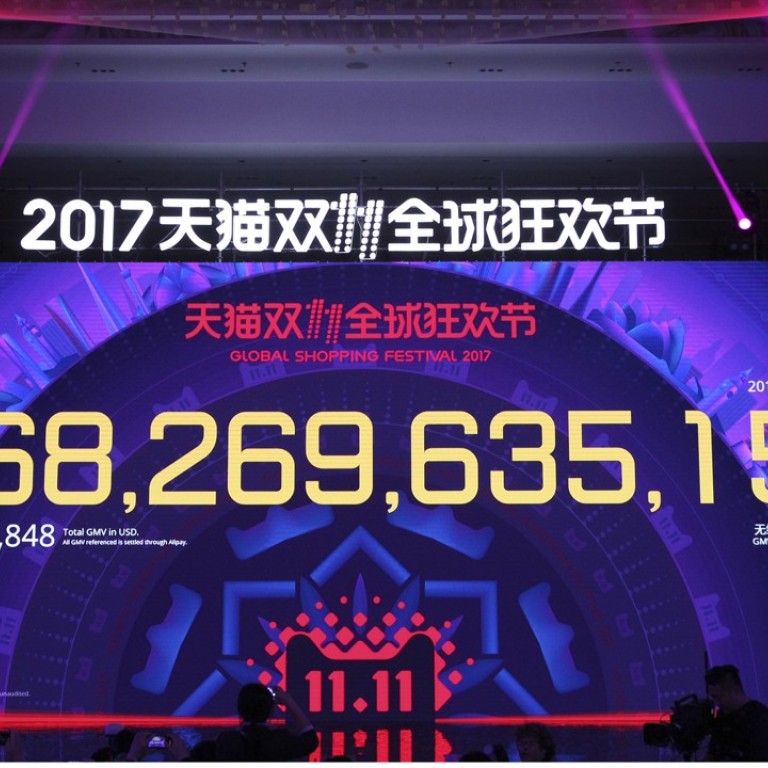
Alibaba smashes Singles’ Day record as online shopping festival goes global
China easily retained its status as the king of retail e-commerce when the Alibaba Group smashed its 24-hour Singles’ Day sales tally from last year, notching up total takings of 168 billion yuan (US$25.3 billion).
The total gross merchandise volume (GMV) – or the amount of sales transacted on the tech giant’s e-commerce platforms - was nearly four times the combined online sales of Black Friday and Cyber Monday in the US.
The event, dubbed the Double Eleven or 11.11, saw Alibaba taking a little over 13 hours to pass its total takings of US$18.1 billion from Singles’ Day in 2016.
The online shopping spree has been held by firm every November 11 since 2009, with brands from China and around the world offering steep discounts on its Taobao market place and Tmall online stores. The practice started in the 1990s when Chinese university students began celebrating being single and splurging on themselves in reaction to society placing so much emphasis on relationships.
“168.2 billion yuan sales is not only a record in China, but also a record worldwide,” said Alibaba chief executive Daniel Zhang Yong.
“The number of orders placed on Alibaba platforms reached 777 million as of 23:30pm.
“Singles’ Day is Olympic Games for Chinese merchants. Sales of 157 merchants exceed 100 million yuan; 17 merchants exceed 500 million; 5 merchants exceed 1 billion yuan.”
An early glimpse of the buying frenzy was seen as consumers spent 10 billion yuan within only three minutes on Alibaba’s e-commerce platforms after the shopping spree kicked off just after midnight Saturday.
During a four-hour live broadcast of the Singles’ Day gala event in Shanghai on Friday, Alibaba gave out 270 million yuan worth of rewards, including free trips to the Antarctic.
Advanced technology was used to demonstrate interaction between technology and humans, with Fifa 2001 World Player of the Year Luís Figo trying to score a goal through a robot goalkeeper. Through virtual reality (VR) and augmented reality (AR) technology, live images of actress Fan Bingbing were transmitted to audiences at home, who could interact with the star via VR headsets.
To top it off, Alibaba founder Jack Ma Yun performed on stage with Hollywood star Nicole Kidman to promote tai chi and Chinese culture.
Rising incomes among China’s 300 million middle-class consumers and their demand for better quality is helping transform the country’s economy from an export- and investment-led model to one that’s driven by consumption, said Joe Tsai, co-founder and vice-chairman of Alibaba Group, which owns the South China Morning Post.
Consumer spending in China accounted for 40 per cent of GDP, compared with almost 70 per cent for the US, and reaching that level would translate to annual spending of US$700 billion to US$800 billion, he said.
“Retail is entertainment,” Tsai told reporters at the Friday evening gala in Shanghai to usher in the event. “Nowadays in China, the first greeting isn’t whether you’ve eaten, but how many items do you have in your shopping cart.”
Rival online retailer JD.com, which launched its own online shopping promotion on November 1, racked up 111 billion yuan in cumulative sales as of 3pm on Saturday, with fashion and household appliances among the most popular categories, according to the company.
Richard Liu, founder and CEO of JD.com, said that over the last decade online merchants have developed to become the major driving force for retail.
“Consumers are increasingly focusing on quality and the experience when it comes to shopping online,” he said.
Twelve minutes and 18 seconds was all it took for the first delivery from Singles’ Day to arrive at the doorstep of a resident surnamed Liu in Shanghai, according to Alibaba. Liu bought biscuits and snacks from the Tmall Supermarket and the order was sent to the nearest warehouse, where automated robots took less than four minutes to complete the pickup and package wrapping.
Nowadays in China, the first greeting isn’t whether you’ve eaten, but how many items do you have in your shopping cart
At 12.33am, a woman surnamed Ru in Ningbo, Zhejiang province received her order of South Korean branded cosmetics, the first consumer to receive imported goods placed on Tmall Global – Alibaba’s cross-border e-commerce platform.
Tsai said Alibaba wants to export the Singles’ Day 24-hour shopping concept to the rest of the world as the company has committed to serve 2 billion consumers worldwide by 2036.
Before the official midnight launch of the shopping frenzy, the Tmall logo and slogan “Wish you a happy Singles’ Day” appeared as LED lights on landmark buildings in cities across the world including Guangzhou, Shanghai, Hong Kong, Berlin, London, Melbourne, Tokyo, Seoul and New York.
Additional reporting by Amanda Lee

